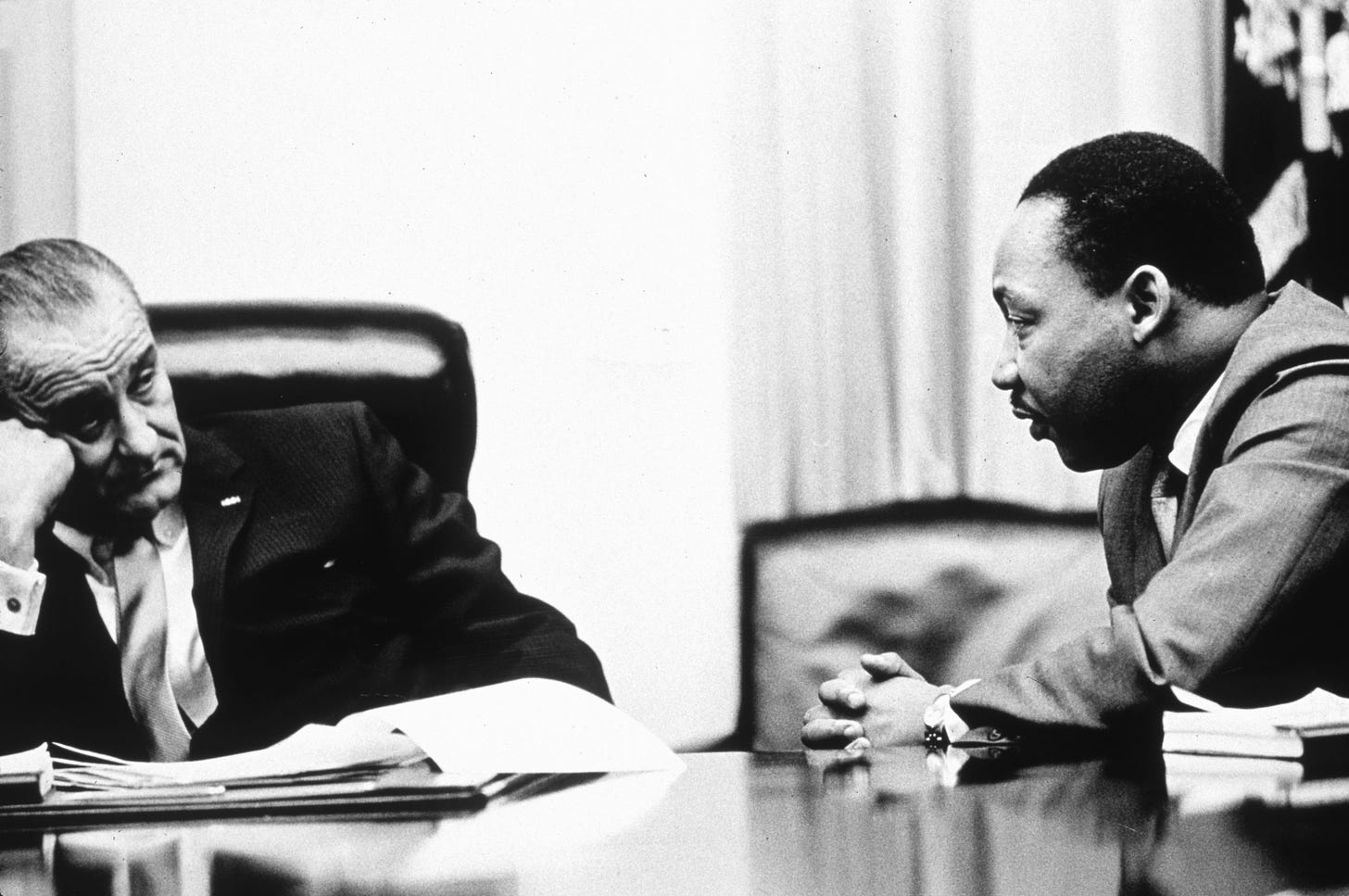
Protecting the Right to Vote
Republicans say their new voting-restrictive laws are not racist. But denying racism in racist actions is nothing new.

Fifty-six years ago, on August 6, 1965, President Lyndon Johnson signed into law the Voting Rights Act. It is rightly remembered as a landmark in the struggle for equal rights, but the labor of protecting the vote continues even now. This week, senators are reportedly working furiously behind the scenes to ready revisions of S. 1, the “For the People Act,” for adoption before next week’s recess. The bill and its House counterpart, H.R. 1, seemed all but dead in June when Sen. Joe Manchin, the West Virginia moderate Democrat, declared that he would vote against it—but a few days later he indicated he would be willing to support an altered version of the legislation.
S. 1, at least as it now stands, would override in federal elections some aspects of the state voter-restrictive laws spreading like the Delta variant through states with Republican-majority legislatures. So far this year, eighteen states have enacted laws restricting the vote, while hundreds of other such bills have been proposed in statehouses across the country.
Study after study has confirmed that election fraud is statistically rare, undermining the state legislators’ purported justification that the new laws are protecting “election integrity.” Yet GOP leaders continue to mouth that defense and to say they are not singling out minority voters. In April, Texas Lt. Governor Dan Patrick declared that charges that Texas’ voting restriction proponents are “racist . . . will not stand.”
Denying racism in racist actions is nothing new. Former Alabama Governor George Wallace, who in 1963 notoriously stood in a doorway trying to block federal troops from requiring the University of Alabama to integrate, once stated, “I had to stand up for segregation or be defeated, but I never insulted black people by calling them inferior.” In Plessy v. Ferguson, the infamous 1896 Supreme Court case whose segregationist “separate but equal” doctrine lasted until its 1954 reversal in Brown v. Board of Education, Justice Henry Billings Brown wrote: “Laws permitting, and even requiring, [the races’] separation . . . do not necessarily imply the inferiority of either race.”
Racism runs wider and deeper than white supremacy. When lending officers targeted minority communities for predatory loans before the 2008 housing market crash, they were implementing profitable bank policies, not acting on beliefs of white superiority. Nonetheless, historic institutional racism underlay the disparate numbers of home-loan bankruptcies among minorities that followed. Indeed, the central insight of critical race theory, the subject of concerted right-wing cultural attack, is that racism inhabiting institutions and policy is far more destructive to minorities’ well-being than personal attitudes.
In everyday usage, the terms “racism” and “racist” are not limited to supremacist intentions or personal malice but also include actions that have the effect of opposing or reducing minorities’ full participation in citizenship. As the Oxford English Dictionary puts it, a “racist” is someone “prejudiced, antagonistic, or discriminatory towards a person or people on the basis of their membership of a particular racial or ethnic group” (emphasis added).
Voting-restrictive bills in Texas and Georgia are antagonistic to black people.
For example, Texas’s bills “zero in” on Harris County, home of Houston, the country’s fourth-largest city and the one with the state’s largest African-American population. The Texas election bills outlaw the 24-hour voting and drive-thru voting that Harris County adopted in November 2020. Both required displaying a photo ID and having their registration confirmed.
In 2020, while Texas overall voted 53 to 46 for Trump, Harris County went 56 to 43 for Biden.
Thus, while legislation may have primarily partisan motivation, that makes it no less “antagonistic” toward African-American election participation. Lest you miss that antagonism in the voting-restriction bills, one Texas Republican state representative, Briscoe Cain, praised the bills for maintaining the “purity of the ballot box.” Presumably the 36-year-old spoke unwittingly, but it is striking that, as Texas historians have observed, that phrase goes back to Jim Crow as code for keeping blacks from polling places.
Similarly, the Republican majority in Georgia’s legislature has targeted Fulton County, which includes most of Atlanta and its 51 percent black population. First, the legislature has initiated the process of taking control of the county’s independent elections board. Second, in Fulton, DeKalb, Gwinnett, and Cobb Counties, Georgia’s new laws also reduce the number of absentee ballot dropboxes from 96 in 2020 to 23. Those are the state’s four largest counties and the four with the largest black populations.
Significantly, voters applying for absentee ballots must provide the number of their Georgia driver’s license, state ID, or another form of identification. The Atlanta Journal-Constitution reported that more than half the voters without a driver’s license or state ID are black.
More states are likely to pass such voting-restrictive bills in the months ahead. Only Congress can blunt their effect. The Supreme Court, which gutted major provisions of the Voting Rights Act in 2013 and 2021, will be of no assistance. The president cannot act alone. And with midterm elections fifteen months away, the window even for congressional action may be closing. The occasion of the anniversary of the Voting Rights Act should serve as a reminder of the central role Congress can play—must play—in ensuring equal access to our most fundamental democratic right.









